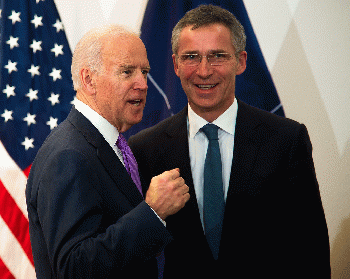Ukraine has been wracked by shocking destruction and deadly violence since Russia invaded the country in February. Estimates of the death toll range from a confirmed minimum of 27,577 people, including 6,374 civilians, to over 150,000.
The slaughter can only get more horrific, as long as all sides including the United States and it's NATO allies remain committed to war.
In the first weeks of the war, the United States and NATO countries sent weapons to Ukraine to try to prevent Russia from quickly defeating Ukraine's armed forces and conducting a U.S.-style "regime change" in Kyiv. But since that goal was achieved, the only goals that President Zelenskyy and his Western allies have publicly proclaimed are to recover all of pre-2014 Ukraine and decisively defeat and weaken Russia.
These are aspirational goals at best, which require sacrificing hundreds of thousands, maybe millions, of Ukrainian lives, regardless of the outcome. Even worse, if they should come close to succeeding, they are likely to trigger a nuclear war, making this the all-time epitome of a "no-win predicament."
At the end of May, President Biden responded to probing questions about the contradictions in his Ukraine policy from the New York Times Editorial Board, replying that the United States was sending weapons so that Ukraine "can fight on the battlefield and be in the strongest possible position at the negotiating table."
But when Biden wrote that, Ukraine had no position at any negotiating table, thanks mainly to the conditions that Biden and NATO leaders attached to their support. In April, after Ukraine negotiated a15-point peace plan for a ceasefire, a Russian withdrawal and a peaceful future as a neutral country, the United States and United Kingdom refused to provide Ukraine with the security guarantees that were a critical part of the agreement.
As now disgraced British prime minister Boris Johnson told President Zelenskyy in Kyiv on April 9th, the "collective West" was "in it for the long run," meaning a long war against Russia, but wanted no part in any agreement between Ukraine and Russia.
In May, Russian forces advanced through Donbas, forcing Zelenskyy to admit, by June 2nd, that Russia now controlled 20% of Ukraine's pre-2014 territory, leaving Ukraine in a weaker, not a stronger position.
Six months after Secretary Austin declared in April that the new goal of the war was to decisively defeat and "weaken" Russia, President Biden is rejecting calls for a new peace initiative. So the United States and United Kingdom had no reservations about intervening to kill peace talks in April, but now that they've sold President Zelenskyy on fighting an endless war, Biden insists that he has no say in the matter if Zelenskyy rejects peace negotiations.
But it is axiomatic that wars end at the negotiating table, as Biden acknowledged to the Times. The perennial thorny question for war leaders is "When to negotiate?" The problem is that, when your side seems to be winning, you have little incentive to stop fighting. But when you appear to be losing, there is no incentive to negotiate from a weak position either, as long as you believe that the tide of war will sooner or later shift in your favor and improve your position. That was the hope on which Johnson and Biden convinced Zelenskyy to stake his country's future in April.
Now Ukraine has launched localized counter-offensives and recovered parts of its territory. Russia has responded by throwing hundreds of thousands of fresh troops into the war and starting to systematically demolish Ukraine's electricity grid.
The escalating crisis exposes the weakness of Biden's position. He is gambling with hundreds of thousands of Ukrainian lives, which he has no moral claim over, that Ukraine will somehow be in a stronger military position after a winter of war and power outages, with hundreds of thousands more Russian troops in the areas Russia controls. This is a bet on a much longer war, in which U.S. taxpayers will shell out for thousands of tons of weapons and millions of Ukrainians will die, with no clear endgame short of nuclear war.
Thanks to the moral and intellectual bankruptcy of the U.S. mass media, most Americans have no inkling of the deceptive way that Biden and his bubble-headed British allies cornered Zelenskyy into a suicidal decision to abandon promising peace negotiations in favor of a long war that will destroy his country.
The horrors of the war, the contradictions in Western policy, the blowback on European energy supplies, the specter of famine stalking the Global South and the rising danger of nuclear war are provoking a worldwide chorus of voices urgently calling for peace in Ukraine.
If you're on a media diet of the thin gruel that passes for news in America these days, you may not have heard the calls for peace from UN Secretary General Guterres, Pope Francis or the leaders of 66 countries speaking at the UN General Assembly in September, representing the majority of the world's population.
(Note: You can view every article as one long page if you sign up as an Advocate Member, or higher).






